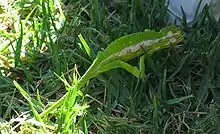chameleon
English

Cape Dwarf Chameleon
Alternative forms
Etymology
From Middle English camelion, from Old French cameleon, from Latin chamaeleon, from Ancient Greek χαμαιλέων (khamailéōn), from χαμαί (khamaí, “on the earth, on the ground”) + λέων (léōn, “lion”); ultimately a calque from Akkadian 𒌨𒈤𒊭𒆠 (nēšu ša qaqqari, “chameleon, reptile”, literally “lion of the ground", "predator that crawls upon the ground”). The spelling was re-latinized in the early 18th century. The physics sense was coined by Justin Khoury and Amanda Weltman in 2003 in a paper in Physical Review Letters.
Pronunciation
Noun
chameleon (plural chameleons)
- A small to mid-size reptile, of the family Chamaeleonidae, and one of the best known lizard families able to change color and project its long tongue.
- (figuratively) A person with inconstant behavior; one able to quickly adjust to new circumstances.
- 2014 September 8, Michael White, “Roll up, roll up! The Amazing Salmond will show a Scotland you won't believe”, in The Guardian:
- He is a political chameleon, as charming to business leaders he met privately in Aberdeen on Friday night as he has been inspiring to distressed and desperate Labour defectors in Glasgow and beyond.
- (physics) A hypothetical scalar particle with a non-linear self-interaction, giving it an effective mass that depends on its environment: the presence of other fields.
Derived terms
Translations
reptile
|
person with inconstant behavior
|
Adjective
chameleon (not comparable)
References
- “chameleon”, in Merriam-Webster Online Dictionary, Springfield, Mass.: Merriam-Webster, 1996–present.
- “chameleon”, in Dictionary.com Unabridged, Dictionary.com, LLC, 1995–present.
- “chameleon” (US) / “chameleon” (UK) in Macmillan English Dictionary.
Further reading
- “chameleon”, in The Century Dictionary […], New York, N.Y.: The Century Co., 1911, →OCLC.
- “chameleon”, in Webster’s Revised Unabridged Dictionary, Springfield, Mass.: G. & C. Merriam, 1913, →OCLC.
- Critical and Philological Notes: Tablet XI, Note 314 in Andrew R. George (2003) The Babylonian Gilgamesh Epic: Introduction, Critical Edition and Cuneiform Texts, Volume II, Oxford University Press, pages 896-897
- nēšu(m) in Black, Jeremy, George, Andrew, Postgate, Nicholas (2000) A Concise Dictionary of Akkadian, 2nd corrected edition, Wiesbaden: Otto Harrassowitz Verlag, page 251
Czech
Alternative forms
Pronunciation
- IPA(key): [ˈxamɛlɛon]
- IPA(key): [ˈxamɛlɛoːn]
Declension
Declension of chameleon (hard masculine animate)
| singular | plural | |
|---|---|---|
| nominative | chameleon | chameleoni, chameleonové |
| genitive | chameleona | chameleonů |
| dative | chameleonovi, chameleonu | chameleonům |
| accusative | chameleona | chameleony |
| vocative | chameleone | chameleoni, chameleonové |
| locative | chameleonovi, chameleonu | chameleonech |
| instrumental | chameleonem | chameleony |
This article is issued from Wiktionary. The text is licensed under Creative Commons - Attribution - Sharealike. Additional terms may apply for the media files.